25 start with Q start with Q

What role does Qatar play in the Middle East and how does it differ from the other Gulf states? How has the ruling Al-Thani family shaped Qatar from a traditional tribal society and British protectorate to a modern state? How has Qatar become an economic superpower with one of the highest per capita incomes in the world? What are the social, political, and economic consequences of Qatar’s extremely rapid development?
In this groundbreaking history of modern Qatar, Allen J. Fromherz presents a full portrait that analyzes Qatar's crucial role in the Middle East and its growing regional influence within a broader historical context. Drawing on original sources in Arabic, English, and French as well as his own fieldwork in the Middle East, the author deftly traces the influence of the Ottoman and British empires and Qatar’s Gulf neighbors on the country prior to Qatar’s meteoric rise in the post-independence era. Fromherz gives particular weight to the nation's economic and social history, from its modest origins in the pearling and fishing industries to the considerable economic clout it exerts today, a clout that comes with having the second-highest natural gas reserves in the region. He also looks at what the future holds for Qatar's economy as the country tries to diversify beyond oil and gas. Furthermore, the book examines the paradox of Qatar where monarchy, traditional tribal culture, and conservative Islamic values appear to coexist with ultra modern development and a large population of foreign workers who outnumber Qatari citizens.
This book is as unique as the country it documents—a multi-faceted picture of the political, cultural, religious, social, and economic make up of modern Qatar and its significance within the Gulf Cooperation Council and the wider region.

What role does Qatar play in the Middle East, and how does it differ from the other Gulf states? How has the ruling Al-Thani family shaped Qatar from a traditional tribal society and British protectorate to a modern state? How has Qatar become an economic superpower with one of the highest per-capita incomes in the world? What are the social, political, and economic consequences of Qatar’s extremely rapid development?
In this groundbreaking history of modern Qatar, Allen J. Fromherz analyzes the country’s crucial role in the Middle East and its growing regional influence within a broader historical context. Drawing on original sources in Arabic, English, and French as well as his own fieldwork in the Middle East, the author deftly traces the influence of the Ottoman and British Empires and Qatar’s Gulf neighbors prior to Qatar’s meteoric rise in the post-independence era.
Fromherz gives particular weight to the nation’s economic and social history, from its modest origins in the pearling and fishing industries to the considerable economic clout it exerts today, a clout that comes from having the region’s second-highest natural gas reserves. He also looks at what the future holds for Qatar’s economy as the country tries to diversify beyond oil and gas. The book further examines the paradox of Qatar where monarchy, traditional tribal culture, and conservative Islamic values appear to coexist with ultramodern development and a large population of foreign workers who outnumber Qatari citizens.
This book is as unique as the country it documents—a multifaceted picture of the political, cultural, religious, social, and economic makeup of modern Qatar and its significance within the Gulf Cooperation Council and the wider region.
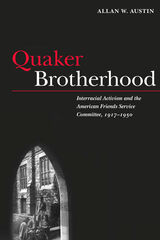

A comprehensive and accessible guide to learning and successfully applying QCA
Social phenomena can rarely be attributed to single causes—instead, they typically stem from a myriad of interwoven factors that are often difficult to untangle. Drawing on set theory and the language of necessary and sufficient conditions, qualitative comparative analysis (QCA) is ideally suited to capturing this causal complexity. A case-based research method, QCA regards cases as combinations of conditions and compares the conditions of each case in a structured way to identify the necessary and sufficient conditions for an outcome.
Qualitative Comparative Analysis: An Introduction to Research Design and Application is a comprehensive guide to QCA. As QCA becomes increasingly popular across the social sciences, this textbook teaches students, scholars, and self-learners the fundamentals of the method, research design, interpretation of results, and how to communicate findings.
Following an ideal typical research cycle, the book’s ten chapters cover the methodological basis and analytical routine of QCA, as well as matters of research design, causation and causal complexity, QCA variants, and the method’s reception in the social sciences. A comprehensive glossary helps to clarify the meaning of frequently used terms. The book is complemented by an accessible online R manual to help new users to practice QCA’s analytical steps on sample data and then implement with their own findings. This hands-on textbook is an essential resource for students and researchers looking for a complete and up-to-date introduction to QCA.
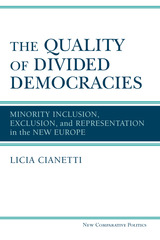
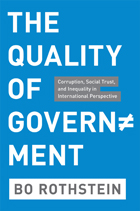
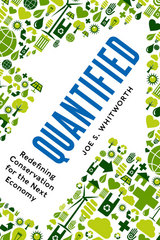
In Quantified, Whitworth draws lessons from the world’s most tech-savvy, high-impact organizations to show how we can make real gains for the environment. The principles of his approach, dubbed quantified conservation, will be familiar to any thriving entrepreneur: situational awareness, bold outcomes, innovation and technology, data and analytics, and gain-focused investment. This no-nonsense strategy builds on the inspirational environmental work begun in the 1970s, while recognizing that the next economy will demand new solutions.
As President of The Freshwater Trust, Whitworth has put quantified conservation into practice, pioneering the model of a “do-tank” that is dramatically changing how rivers can get restored across the United States. The stories in Quantified highlight the most precious of resources—water—but they apply to any environmental effort. Whether in the realm of policy, agriculture, business, or philanthropy, Whitworth is charting a new course for conservation.

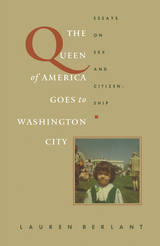
As Berlant traces the guiding images of U.S. citizenship through the process of privatization, she discusses the ideas of intimacy that have come to define national culture. From the fantasy of the American dream to the lessons of Forrest Gump, Lisa Simpson to Queer Nation, the reactionary culture of imperilled privilege to the testimony of Anita Hill, Berlant charts the landscape of American politics and culture. She examines the consequences of a shrinking and privatized concept of citizenship on increasing class, racial, sexual, and gender animosity and explores the contradictions of a conservative politics that maintains the sacredness of privacy, the virtue of the free market, and the immorality of state overregulation—except when it comes to issues of intimacy.
Drawing on literature, the law, and popular media, The Queen of America Goes to Washington City is a stunning and major statement about the nation and its citizens in an age of mass mediation. As it opens a critical space for new theory of agency, its narratives and gallery of images will challenge readers to rethink what it means to be American and to seek salvation in its promise.
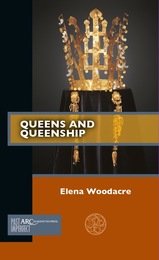
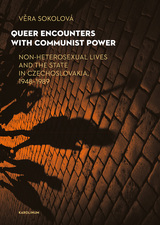
Contrary to expectations, the book reveals that despite the Czechoslovak Communist regime’s brutality in many areas of life, the state did not carry out a hateful or seditious campaign against homosexual and non-heterosexual people. Rather, the official state sexology offices functioned from the late 1970s onward as essentially the first gay clubs in socialist Czechoslovakia. Interweaving the memories of non-heterosexual Czech women born between 1929 and 1952, Věra Sokolová’s study both enriches and challenges existing scholarship on lesbian and gay history during this era, promising to radically change the way we view gender, sexuality, and everyday life during East European socialism.
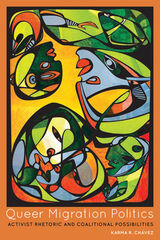
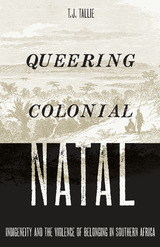
How were indigenous social practices deemed queer and aberrant by colonial forces?
In Queering Colonial Natal, T.J. Tallie travels to colonial Natalestablished by the British in 1843, today South Africa’s KwaZulu-Natal provinceto show how settler regimes “queered” indigenous practices. Defining them as threats to the normative order they sought to impose, they did so by delimiting Zulu polygamy; restricting alcohol access, clothing, and even friendship; and assigning only Europeans to government schools.
Using queer and critical indigenous theory, this book critically assesses Natal (where settlers were to remain a minority) in the context of the global settler colonial project in the nineteenth century to yield a new and engaging synthesis. Tallie explores the settler colonial history of Natal’s white settlers and how they sought to establish laws and rules for both whites and Africans based on European mores of sexuality and gender. At the same time, colonial archives reveal that many African and Indian people challenged such civilizational claims.
Ultimately Tallie argues that the violent collisions between Africans, Indians, and Europeans in Natal shaped the conceptions of race and gender that bolstered each group’s claim to authority.

Co-Winner of the 2015 Charles Tilly Award for Best Book of the Collective Behavior and Social Movements section from the American Sociological Association
Over four thousand gay and lesbian couples married in the city of San Francisco in 2004. The first large-scale occurrence of legal same-sex marriage, these unions galvanized a movement and reignited the debate about whether same-sex marriage, as some hope, challenges heterosexual privilege or, as others fear, preserves that privilege by assimilating queer couples.
In Queering Marriage, Katrina Kimport uses in-depth interviews with participants in the San Francisco weddings to argue that same-sex marriage cannot be understood as simply entrenching or contesting heterosexual privilege. Instead, she contends, these new legally sanctioned relationships can both reinforce as well as disrupt the association of marriage and heterosexuality.
During her deeply personal conversations with same-sex spouses, Kimport learned that the majority of respondents did characterize their marriages as an opportunity to contest heterosexual privilege. Yet, in a seeming contradiction, nearly as many also cited their desire for access to the normative benefits of matrimony, including social recognition and legal rights. Kimport’s research revealed that the pattern of ascribing meaning to marriage varied by parenthood status and, in turn, by gender. Lesbian parents were more likely to embrace normative meanings for their unions; those who are not parents were more likely to define their relationships as attempts to contest dominant understandings of marriage.
By posing the question—can queers “queer” marriage?—Kimport provides a nuanced, accessible, and theoretically grounded framework for understanding the powerful effect of heterosexual expectations on both sexual and social categories.

Sears draws upon extensive oral history accounts, archival material, and personal narratives to chronicle “the Battle for Rehoboth,” which unfolded in the late 20th century, as conservative town leaders and homeowners opposed progressive entrepreneurs and gay activists. He recounts not just the emergence of the gay and lesbian bars, dance clubs, and organizations that drew the queer community to the region, but also the efforts of local politicians and homeowners, among other groups who fought to develop and protect the traditional identity of this beach town. Moreover, issues of race, class, and gender and sexuality informed opinions as residents and visitors struggled with the AIDS crisis and the legacy of Jim Crow.
Queering Rehoboth Beach is more than just an inspiring story about a community’s resilience and determination to establish a safe space for itself in the wake of the era of Don’t Ask, Don’t Tell. It is also a terrific beach read.
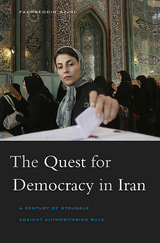
The Constitutional Revolution of 1906 launched Iran as a pioneer in a broad-based movement to establish democratic rule in the non-Western world. In a book that provides essential context for understanding modern Iran, Fakhreddin Azimi traces a century of struggle for the establishment of representative government.
The promise of constitutional rule was cut short in the 1920s with the rise of the Pahlavi dynasty. Reza Shah, whose despotic rule Azimi deftly captures, maintained the façade of a constitutional monarch but greeted any challenge with an iron fist: “I will eliminate you,” he routinely barked at his officials. In 1941, fearful of losing control of the oil-rich region, the Allies forced Reza Shah to abdicate but allowed Mohammad Reza to succeed his father. Though promising to abide by the constitution, the new Shah missed no opportunity to undermine it.
The Anglo-American–backed coup of 1953, which ousted reformist premier Mohammed Mosaddeq, dealt a blow to the constitutionalists. The Shah’s repressive policies and subservience to the United States radicalized both secular and religious opponents, leading to the revolution of 1979. Azimi argues that we have fundamentally misunderstood this event by characterizing it as an “Islamic” revolution when it was in reality the expression of a long-repressed desire for popular sovereignty. This explains why the clerical rulers have failed to counter the growing public conviction that the Islamic Republic, too, is impervious to political reform—and why the democratic impulse that began with the Constitutional Revolution continues to be a potent and resilient force.
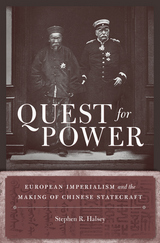
China’s history in the nineteenth and early twentieth centuries has often been framed as a long coda of imperial decline, played out during its last dynasty, the Qing. Quest for Power presents a sweeping reappraisal of this narrative. Stephen Halsey traces the origins of China’s great-power status in the twentieth century to this era of supposed decadence and decay. Threats from European and Japanese imperialism and the growing prospect of war triggered China’s most innovative state-building efforts since the Qing dynasty’s founding in the mid-1600s.
Through a combination of imitation and experimentation, a new form of political organization took root in China between 1850 and 1949 that shared features with modern European governments. Like them, China created a military-fiscal state to ensure security in a hostile international arena. The Qing Empire extended its administrative reach by expanding the bureaucracy and creating a modern police force. It poured funds into the military, commissioning ironclad warships, reorganizing the army, and promoting the development of an armaments industry. State-built telegraph and steamship networks transformed China’s communication and transportation infrastructure. Increasingly, Qing officials described their reformist policies through a new vocabulary of sovereignty—a Western concept that has been a cornerstone of Chinese statecraft ever since. As Halsey shows, the success of the Chinese military-fiscal state after 1850 enabled China to avoid wholesale colonization at the hands of Europe and Japan and laid the foundation for its emergence as a global power in the twentieth century.
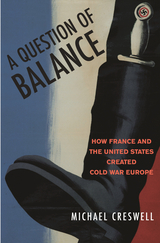
Challenging standard interpretations of American dominance and French weakness in postwar Western Europe, Michael Creswell argues that France played a key role in shaping the cold war order. In the decade after the war, the U.S. government's primary objective was to rearm the Federal Republic of Germany within the framework of a European defense force--the European Defense Community. American and French officials differed, however, over the composition of the EDC and the rules governing its organization and use.
Although U.S. pressure played a part, more decisive factors--in both internal French politics and international French concerns--ultimately led France to sanction the plan to rearm West Germany. Creswell sketches the successful French challenge to the United States, tracing the genuine, sometimes heated, debate between the two nations that ultimately resulted in security arrangements preferred by the French but acceptable to the Americans.
Impressively researched and vigorously argued, A Question of Balance advances significantly our understanding of power politics and the rise of the cold war system in Western Europe.
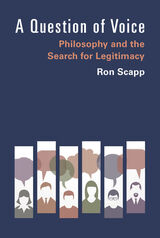
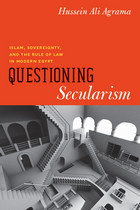
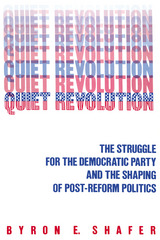
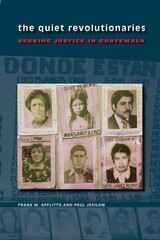
The last three decades of the twentieth century brought relentless waves of death squads, political kidnappings, and other traumas to the people of Guatemala. Many people fled the country to escape the violence. Yet, at the same moment, a popular movement for justice brought together unlikely bands of behind-the-scenes heroes, blurring ethnic, geographic, and even class lines.
The Quiet Revolutionaries is drawn from interviews conducted by Frank Afflitto in the early 1990s with more than eighty survivors of the state-sanctioned violence. Gathered under frequently life-threatening circumstances, the observations and recollections of these inspiring men and women form a unique perspective on collective efforts to produce change in politics, law, and public consciousness. Examined from a variety of perspectives, from sociological to historical, their stories form a rich ethnography. While it is still too soon to tell whether stable, long-term democracy will prevail in Guatemala, the successes of these fascinating individuals provide a unique understanding of revolutionary resistance.
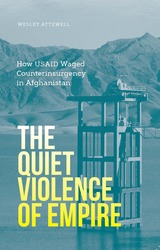
How the U.S. empire-state transformed post-1945 Afghanistan into a key site for reimagining development
Established in 1961 by President Kennedy, the United States Agency for International Development (USAID) is often viewed as an extension of the security state, playing a constant role on the ground in Afghanistan since the early sixties. The Quiet Violence of Empire traces USAID’s long and bloody history of development work in the region, revealing an empirically rich account of the transnational entanglements of imperialism and racial capitalism.
Wesley Attewell carefully analyzes three chronological moments of development as counterinsurgency in action: the Helmand Valley Project, the Soviet–Afghan conflict, and the post-9/11 occupation in Afghanistan. These case studies expose how USAID’s very public commitment to bringing seemingly inclusionary forms of self-help, technical assistance, and market development to Afghanistan has been undergirded by longer-standing infrastructures of race war and racial management. Attewell exposes how one of the net effects of USAID’s development mission to Afghanistan has been to constrain the life chances of Afghan beneficiaries while simultaneously diverting development capital back to U.S. contractors, deftly underscoring the notion of development as a form of slow violence.
The Quiet Violence of Empire asks the critical question: how might we refuse the ruse of USAID and its endlessly deferred promise of development? Thinking relationally across the fields of human geography, global studies, and critical ethnic studies, it uncovers the explicitly racial underpinnings of international development theory and praxis.
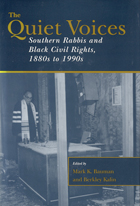
These wide-ranging essays reveal the various roles played by southern rabbis in the struggle for black civil rights since Reconstruction
The study of black-Jewish relations has become a hotbed of controversy, especially with regard to the role played by Jewish leaders during the Civil Rights movement. Did these leaders play a pivotal role, or did many of them, especially in the South, succumb to societal pressure and strive to be accepted rather than risk being persecuted? If some of these leaders did choose a quieter path, were their reasons valid? And were their methods successful?
Individually, each essay offers a glimpse into both the private and public difficulties these rabbis faced in their struggle to achieve good. Collectively, the essays provide an unparalleled picture of Jewish leadership during the civil rights era.
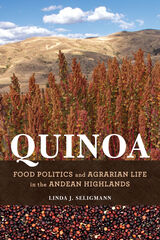
The untold story behind the popular health food, Quinoa illuminates how Indigenous communities have engaged with the politics and policies surrounding their production of a traditional and minor crop that became a global foodstuff.
READERS
Browse our collection.
PUBLISHERS
See BiblioVault's publisher services.
STUDENT SERVICES
Files for college accessibility offices.
UChicago Accessibility Resources
home | accessibility | search | about | contact us
BiblioVault ® 2001 - 2024
The University of Chicago Press









